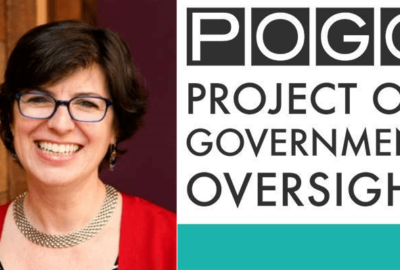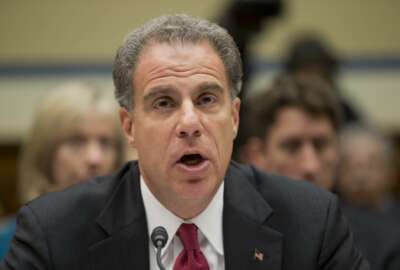

Former ATF special agent and whistleblower Vincent Cefalu says the bureau needs a permanent director, and more accountability in dealing with whistleblowers.
The Bureau of Alcohol, Tobacco, Firearms and Explosives has earned its fair share of black eyes in the past few decades: Waco, Ruby Ridge, Fast and Furious. According to former ATF Special Agent Vincent Cefalu, who helped blow the whistle on the Fast and Furious debacle, that’s partially a function of a hard-charging, cowboy law enforcement culture, but also owes quite a bit to issues at the top of the agency.
“When you have the mentality, agencywide mentality that we’re bigger, faster, stronger, slicker, cooler, smarter than anybody else in the FBI, Secret Service, US Customs, US Marshals, you know, as those people move up the ranks that mentality kind of goes with them,” Cefalu said on Agency in Focus – Justice Department. “And you start thinking, believing your own press and maybe not ready to hang up your spurs.”
But that attitude, he said, is also a source of pride among ATF’s field agents, and part of what makes them so successful.
“Look, for all of our mistakes, no one has as aggressively run to meet violent offenders face-to-face on their own like ATF has,” he said. “They’ve done it for 40 years since the moonshine days and continue to do it. You know, I’ve worked with many other agencies throughout my career. And quite frankly, when it comes to the street level work, they turn to us.”
Cefalu said that’s part of what attracted him to ATF in the first place. As a Customs agent, he worked a case alongside an ATF agent, and was impressed by that agent’s work ethic, his ability to take charge and run a case with so many working parts, and the professionalism with which he did so.
He said he met a few other ATF agents in a short period of time after that, and each one similarly impressed him.
“The ATF agents I met were like the last cowboys of federal law enforcement,” Cefalu said. “They were still getting dirty on the street, you know, wearing out shoe leather, going vigorously after bad guys. And you know, it wasn’t a groupthink mentality. It was, you know, get out there and do something.”
But there’s a division between the leadership of the bureau and the rank-and-file agents that hinders the bureau from making many of the changes it desperately needs. He called it an “us-and-them mentality,” made worse by the fact that the bureau hasn’t had a permanent director in years.
“The field agents, and not just in the undercover field, but across the board, you never know what your budget’s going to do. You never know,” Cefalu said. “There’s just no sense of stability. And you can’t look for the future. How’s an acting director, retiring in the next two years, going to put out a five year plan?”
That lack of an acting director denies ATF a true seat at the table, Cefalu said. Everyone else sees the “acting” qualifier, and dismisses them out of hand. Among other things, Cefalu said that’s one reason why Congress hasn’t appropriated the money to increase the number of ATF agents since 1986. Nobody has had the clout to argue for it.
“You’re not really being considered a player. So I’m concerned about the future of ATF,” he said. “And we’re not doing ourselves any help with some of these recent escapades. But you know, some of that can be rectified, if we had a permanent director with skin in the game. Not an acting director who can retire any day if he or she wants.”
Another issue the agency needs to address, Cefalu said, is how it deals with whistleblowers. At the end of his career, he got a first-hand view of how hostile the environment can become for whistleblowers at ATF.
“Truthfully, I don’t think it’s progressed at all,” he said. “I think they’ve made cursory attempts to strengthen some of the Whistleblower Protection. But the truth be known, to this day, if you expose, you know, corruption, or malfeasance, gross mismanagement, waste, fraud and abuse within my agency, you can just about expect to have your head caved in like I did.”
Unfortunately, Cefalu said, the bad actors are insulated by the culture, while the whistleblowers are vulnerable. Aside from a permanent director with the mandate and the clout to go to bat for the bureau and institute long-term plans, Cefalu has one other suggestion to improve ATF.
“I would institute a transparent form of accountability,” he said. “It states in our policies, it states in the Office of Special Counsel laws, that any manager ever proven to have discriminated or retaliated against an employee or whistleblower will be immediately terminated. I worked for several and there were formal findings of discrimination or retaliation. Know what they did? Transfer them to another field division. They’re supposed to post a notice, attesting to the finding of retaliation so all the employees can see. When mine was going on, they posted the finding of retaliation behind the refrigerator door in the break room. They do what they want, and as you know, people keep doing what they want until they face consequences when they screw up.”
Editor’s note: Vincent Cefalu wrote about his experiences as an ATF undercover special agent in his upcoming book, RatSnakes: Cheating Death by Living A Lie: Inside the Explosive World of ATF’s Undercover Agents and How We Changed the Game.
Copyright © 2025 Federal News Network. All rights reserved. This website is not intended for users located within the European Economic Area.
Daisy Thornton is Federal News Network’s digital managing editor. In addition to her editing responsibilities, she covers federal management, workforce and technology issues. She is also the commentary editor; email her your letters to the editor and pitches for contributed bylines.
Follow @dthorntonWFED



